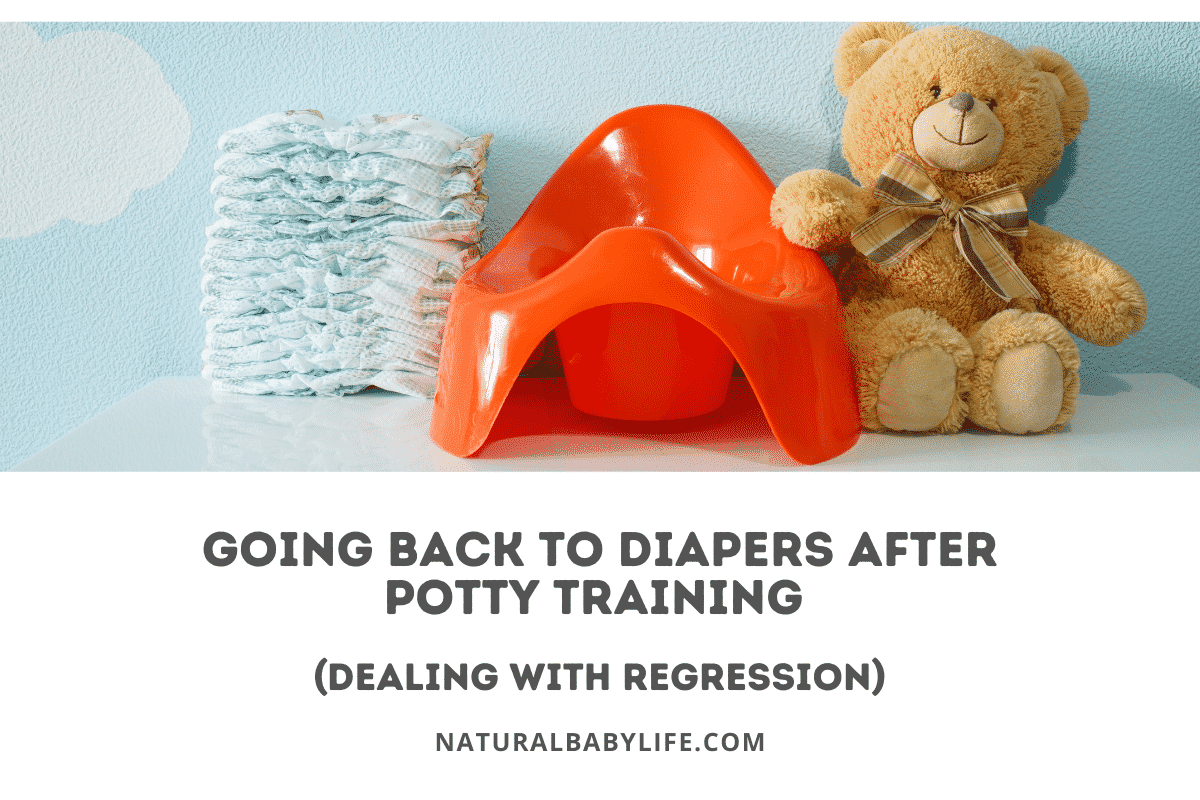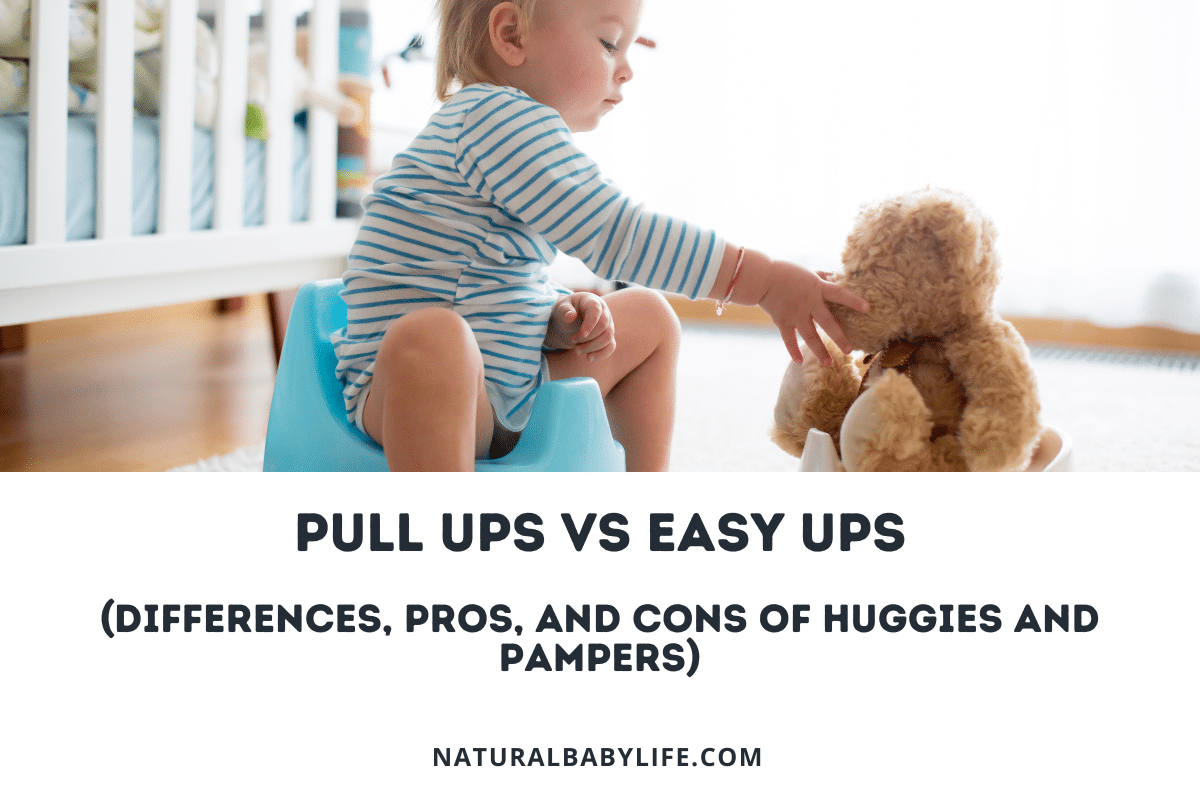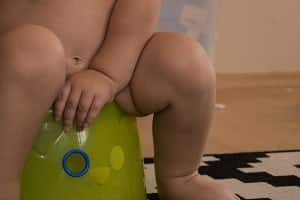When you’re raising little ones, progress isn’t always linear. Just like sleep regression, dealing with potty training regression can be stressful for both parents and kids. But, is going back to diapers after potty training the best way to deal with regression?
It’s best to continue encouraging your child to use the potty rather than going back to diapers after potty training. Regression is usually due to temporary stressors in a toddler’s world. It’s a way for them to feel more in control when they are scared or overwhelmed. Only return to diapers if your child wasn’t ready to potty train yet.
Read on to find out what regression is and why it happens. We’ll also give you tips on how to deal with regression without going back to diapers after potty training.
Table of Contents
Should you put your toddler back into diapers?
The answer to this question depends on how long your toddler has been potty trained, and how they feel about it.
If potty training has gone well for weeks or even months and your child seems to be progressing with fewer and fewer accidents, don’t put your toddler back into diapers. The regression is likely either a change in their environment that needs to be addressed or a medical issue that needs to be checked out by your pediatrician.
It’s important to be consistent with your child when they are potty training. Normally if you can pinpoint the issue and address it, they’ll be back in the groove in no time.
Switching between big kid underwear and diapers will only confuse your child and could prolong the potty training process. It’s inconvenient and frustrating, but a little investigation and compassion for a few more weeks will be less stressful for everyone in the family.
If your child has only been accident-free for a few weeks and suddenly starts having multiple accidents a day again, try to examine what may be going on. If your child wasn’t curious and enthusiastic about using the big kid potty and ditching the diapers, it’s possible they just weren’t ready yet.
Why is your toddler suddenly having accidents?
Occasional accidents happen, but true regression means there’s something that needs attention. Changes in their environment can cause your child stress that takes their focus off staying dry. Usually, they are mentally or emotionally overwhelmed when this happens.
What is potty training regression?
Potty training regression occurs when a child who has previously been potty trained starts having a lot of accidents. It can be frustrating for parents when their child finally seems potty trained, only for them to start having regular accidents again.
Is it normal for a child to regress in potty training?
It is normal for a child to regress during potty training. There are many emotional and physical reasons that your child may regress during or after potty training. It’s important to understand what may be causing the regression so it can be addressed.
Some of the reasons could be:
- Distraction or fatigue.
- Going to a new daycare or changing caregivers.
- Moving to a new house.
- Pregnancy or birth of a new sibling.
- Family conflict or divorce.
- Medical condition.
Whatever you do, don’t scold them for the accidents. Try to be as emotionless as possible about the accidents with your child. You can even calmly enlist them to help you by having them change out of their wet clothes or help you remake the bed after a nap or nighttime accident.
Potty training regression in 2-year-olds
Most toddlers don’t develop the readiness and motor skills needed for potty training until after their second birthday. The median age for staying dry through the day is between 32.5 and 35 months. If your 2-year old seems to be fully trained but regresses, it could be that they still lack the maturity or physical skills needed for now.
Potty training regression in 3-year-olds
Potty training regression with 3-year-olds is pretty common. Children in the United States are potty training significantly later than several decades ago. The average age for a toddler to begin potty training is now between 21 months and 3 years of age. Only about half of children complete potty training by 3 years old.
How many potty training accidents are normal?
Parents report about 80% of children have some setbacks during potty training. You could see more accidents than there were during the actual training itself. Typically children who regress can have as many as 6 or 7 accidents a day if they aren’t prompted to go by a parent.
Some parents report just a few accidents, and others tell horror stories of constantly cleaning up pee and poop while their toddler was in a regression period. The good news is that it usually doesn’t last that long. Just go back to being diligent about reminders and scooping them up when it looks like they’re getting ready to go.
What if your potty-trained toddler is having accidents on purpose?
Sometimes toddlers are just strong-willed. This is why your child must be both physically and emotionally ready to begin potty training at the start. If you’re putting pressure on your child to be fully potty trained, or start them too soon before they’re emotionally and physically ready, your child may rebel against the idea.
Another reason why your potty-trained toddler may be having accidents on purpose is that they have a desire for more attention from you. If your child is feeling insecure or needs more attention, they may stage more accidents just to have the interaction with you.
If you can relax and let the child show you when they’re ready, they will likely succeed more quickly.
How to handle potty training regression
The best thing to do when your child has a potty training regression is to take a deep breath and remember that this is all a normal part of raising them. While we’re happy when we can get past the constant barrage of diaper changes, remember your child is still a tiny human.
Sometimes, they just aren’t ready, or something throws them off the path temporarily. If you’re patient, they’ll be back to clean, dry undies before you know it. Most regressions only last a couple of weeks if there are no underlying medical conditions and the child was ready to be potty trained.
Until then, here are some things to help you handle potty training regression and still keep your sanity:
Find out why
It’s important to first try to find the cause of your child’s regression. Finding the possible reason will help guide you on how best to handle the situation with your child. It can also help you have the needed empathy to be patient and positive with your child so the regression period doesn’t last longer than necessary. Let them know you understand, that it’s okay and accidents happen to lots of kids.
Sympathize and try to help
Try not to let your negative emotions show. Reassure your child that you understand their feelings and that it’s okay. Make sure they know that they are still a “big” kid. Here are more suggestions to help:
- Going to a new daycare or changing caregivers – work with the caregiver to help your child get comfortable with them and with the potty at the new school.
- Moving to a new house – try putting stuffed animals or other familiar items from the old house around or near the potty to help your child feel more comfortable.
- Pregnancy or birth of a new sibling – arrange for special time alone with you, or have them help with the new baby like holding and handing you things while you change diapers. Or plan special walks where they go with you and the baby to ‘help’.
- Family conflict or divorce – reassure your child they are loved and try to maintain routines as much as possible. Routines are very important to young children. Also try to buy identical potty chairs, underwear, rewards, charts, or books at both houses. Keep them in the same place in both houses. Keeping things consistent will be easier for your child.
- Medical condition – urinary tract infections, constipation, overactive bladder, or other conditions may be causing your child’s regression. Check with your child’s pediatrician if you notice they have pain, strain, or can’t hold their urine.
Stay calm
As frustrating as a setback in potty training can be, you must approach it calmly and matter-of-factly. If your child is struggling with changes or insecurities they have about things around them, they may feel ashamed or upset that you’re disappointed or frustrated with them. They will recover quicker if you don’t allow emotions to take over.
Know when they’re ready
Understand when your child is ready for potty training. It’s different for each child based on when they develop the necessary skills and understanding to start potty training. Regressions are usually short-lived if any issues are addressed.
If it lasts longer than a month, you may want to consider that they just weren’t ready. This would be the only time it’s recommended to go back to diapers until they are ready rather than continuing to push them in training.
Be positive and encouraging
If you can remain upbeat and encouraging, you’ll be teaching your child that it’s okay to have setbacks and to keep trying their best. Give them praise when they’re dry, and when they have an accident, just roll with “oops, you had an accident.” “Let’s go sit on the potty!”
Reinforce expectations and training
Let your child know that you still expect them to go to the potty when they need to and have clean, dry underwear. Reinforce the training with them by giving gentle reminders to use the potty after they wake up, during playtime, before nap, after mealtimes, and before bed.
Use rewards
If you used a reward system (like using stickers on a chart) during their initial training, try going back to that system for a while to reinforce the habit of going to the potty. You can also clap, cheer, or give them a hug when they go.
It’s tempting to be frustrated and even a little angry if you’re suddenly back to cleaning up several accidents in a day. However, regression is a natural part of potty training and many children go through it. The best thing to do is remain calm, keep reinforcing your child’s progress and training, help them with any emotional or physical issues and let them know you’ll get there together.




![Daycare Not Helping with Potty Training [Co-Training with Consistency]](https://naturalbabylife.com/wp-content/uploads/2021/05/daycare-not-helping-with-potty-training_featured.png)


